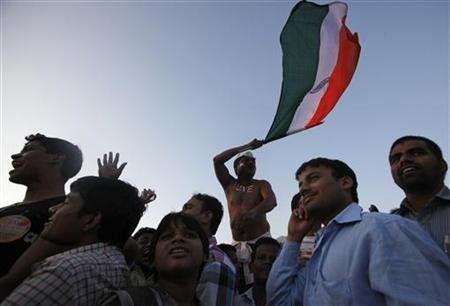Lok Sabha Passes Lokpal Bill by Voice Vote

The Lok Sabha passed the Lokpal bill on Tuesday to create an anti-corruption ombudsman, in a move the government hopes will deflate a protest movement whose leader Anna Hazare has tapped into widespread anger at corrupt public officials.
Prime Minister Manmohan Singh's government has been the target of middle-class frustration with everyday graft and multi-billion dollar scandals in Asia's third largest economy. Under duress, the government agreed to pass the anti-corruption bill before the year end.
We have ... fulfilled our objective of bringing these bills to parliament as we had promised, Singh told the NDTV network after a bill first proposed more than 40 years ago finally passed in a rowdy debate where several parties stormed out.
In a sign of the rough ride the legislation will likely get in the upper house, the government failed to get the two-thirds majority it needed to make the bill a constitutional amendment.
In the upper house, the ruling coalition is in a minority, which means the bill - known as the Lokpal bill in Sanskrit, meaning protector of the people - may not quickly pass into law.
It is a bit of a disappointment that we could not get the constitutional amendment bill passed, Singh said, as party colleagues blamed the opposition for the setback.
Hazare, 74, who began a three-day fast to coincide with the parliamentary debate, wants the ombudsman to have greater powers to investigate high ranking scammers. He says the protests will continue unless his demands are met.
Hazare set the political agenda in 2011 and weakened Singh who was seen as indecisive as the protests spread. The prime minister is keen to put the corruption debate to bed quickly and focus on a string of state elections and economic reform in the New Year.
Seen as a hero by many, Hazare swept to national prominence this summer when tens of thousands came out in support of a two-week hunger strike after months of news about corruption scandals damaged India's image as an emerging power.
Among the worst cases were a telecoms licence scam that cost the exchequer $39 billion, according to one government probe, and rampant financial misdealings around the shambolic 2010 Commonwealth Games in Delhi.
FEVER
Hazare's health was in question on Tuesday just hours after he started his latest fast, with TV saying he may need to be hospitalised for a high fever and blood pressure. Doctors visited the protest site in India's financial capital Mumbai and took blood samples for testing.
His support has flagged in recent weeks, with the government's apparent willingness to bow to many of his demands taking the sting out of his arguments that nothing is being done. Accusations of financial misdeeds by his aides and infighting have also taken their toll.
Turnout was small for his protest on Tuesday compared to the crowds of tens of thousands that accompanied him in August. Hazare aide Vishwambhar Chaudhari admitted there was confusion over the purpose of the new hunger strike.
There is neither an agenda nor a key objective for this strike, hence it has failed to attract supporters, Chaudhari said from the vast but mostly-empty palm tree-fringed protest site in balmy Mumbai, adding he hoped numbers would pick up.
Hazare's team plans to picket Congress party leaders' homes from Friday and over New Year's Eve.
The battle for an ombudsman is unlikely to be over yet, but Singh's Congress party will be able to trumpet the passage of the bill as it fights elections in five states in the next few weeks.
Key among the elections is the northern heartland Uttar Pradesh, India's most populous state, where the campaign is being fought by Rahul Gandhi, the scion of a dynasty of leaders.
It was Gandhi who proposed to give the ombudsman constitutional status, on a par with prestigious institutions such as the election commission and the opposition was quick to play up that setback.
The responsibility of getting the constitutional amendment bill passed rests with the government, said Yashwant Sinha of the opposition Bharatiya Janata Party. The government miserably failed to carry that constitutional amendment bill.
© Copyright Thomson Reuters {{Year}}. All rights reserved.





















